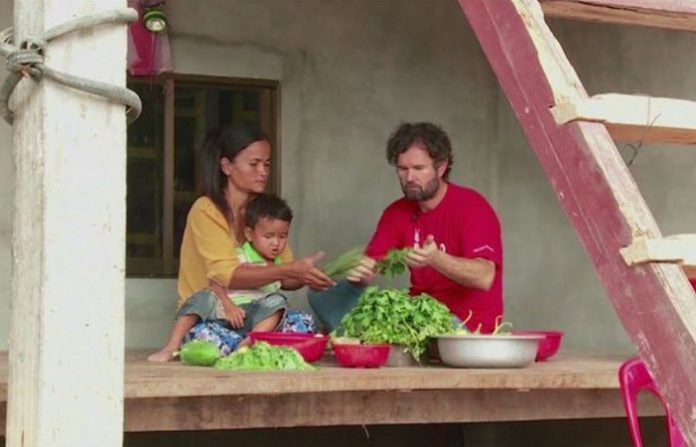
Italian chef, Carlo Cracco, renowned for his innovative recipes merging traditional Italian cuisine with textures and flavours from all over the world, came to Cambodia to draw attention to the impact climate change is having on farmers who are hard hit by rising temperatures and are losing essential staple crops.
In Kandal province in southern Cambodia, chef Cracco is visiting the home of local farmers Somreth Sophat and Chiv Hy. They tell him how they are struggling as soaring temperatures and unpredictable rains are putting their cultivations at risk.
Here, rice which accounts for almost 80% of crop and is a staple food in most of Asia, is effected by frequent droughts and damaging floods.
For Carlo Cracco it is worse than he expected.
SOUNDBITE (Italian) Carlo Cracco, chef:
“The situation has worsen a lot and if it goes on like this it will get even worse because if they can’t produce rice, which is their main staple, their life, their tradition, their culture – the most basic for them.”
Cracco and Somreth are preparing somlar koko, a local soup made with pork and fish and a mixture of locally found vegetables.
Somreth says they used to grow all the ingredients themselves but now, with climate change, they are finding it increasingly challenging.
SOUNDBITE (Khmer) Somreth Sophat, farmer:
“Before it was not difficult, but now due to frequent drought even bananas don’t grow and other vegetables that we normally grow here are not doing well, not enough to eat. We cannot grow all the vegetables we need so sometimes I collect food from neighbours.”
Introducing low-cost technology and more efficient farming practices the United Nation’s International Fund for Agricultural Development (IFAD) is helping around 90 thousand farmers like Chiv and Somreth build their resilience to climate change.
Drum seeders help improve yields, save on seeds and halves the amount of time spent sowing in the scorching heat. Planting the rice in neat rows makes weeding easier and they can use less pesticide.
For growing their vegetables, they adopt permaculture and a use a drip-irrigation system, cutting down on water usage while maintaining soil moisture.
Somreth and Chiv also use manure from their pigs and cows to feed a biogas digester, which provides them with all the methane gas they need for cooking, saving time collecting wood, reducing deforestation and making cooking a smoke-free experience.
From the other end of the digester comes a useful by-product, bio slurry, a potent natural fertiliser which they can use on their vegetables and rice.
They have also been trained on how to diversifying their produce, so if one crop fails, they will not go hungry.
These practices are also improving their incomes says IFAD’s country programme officer Meng Sakphouseth.
SOUNDBITE (English) Meng Sakphouseth, Country Programme Officer, IFAD:
“They have more assets; they also earn more money, produce more crops and have a more diversified farming system, which helps them cope better with climate change such as droughts of floods.”
As they sit for lunch with famous chef, Somreth and Chiv are unsure if, because of the climate change, a dish like somlar koko will be a family tradition in the future.
For Cracco, the only path ahead is resilience, adaptation to the changing climate, and preservation of their traditional food culture.
SOUNDBITE (Italian) Carlo Cracco, chef:
“What you have now, you must cultivate, maintain and preserve it over the time not waste it. Because when you have it, you don’t appreciate its value. When there’s nothing, you say “Gosh! It was so much better before, but then it is already too late””
Carlo Cracco is one of the three judges of Masterchef Italy, presenter of Hells Kitchen and chef and owner of Cracco restaurant, which has earned two Michelin stars and is listed as one of the fifty best restaurants in the world.

